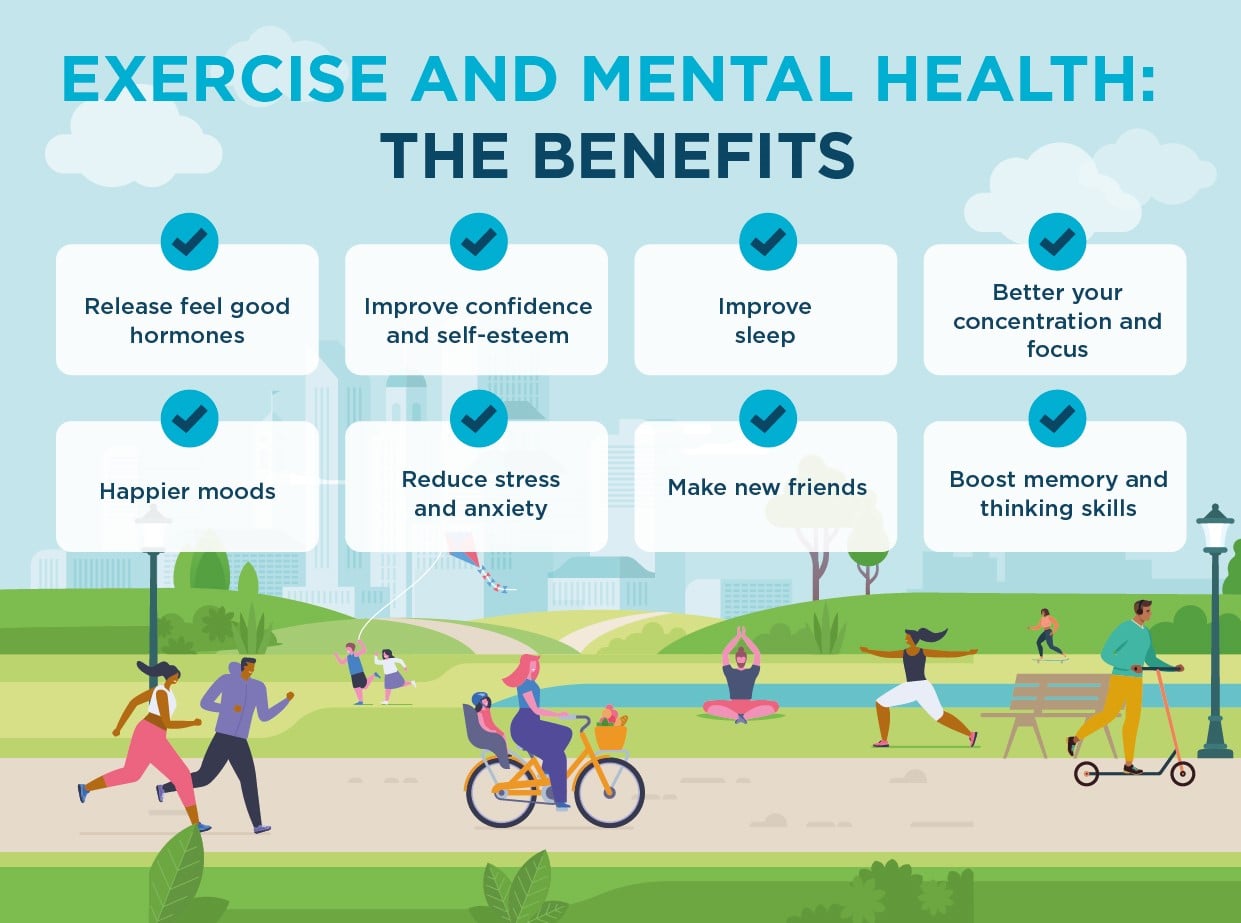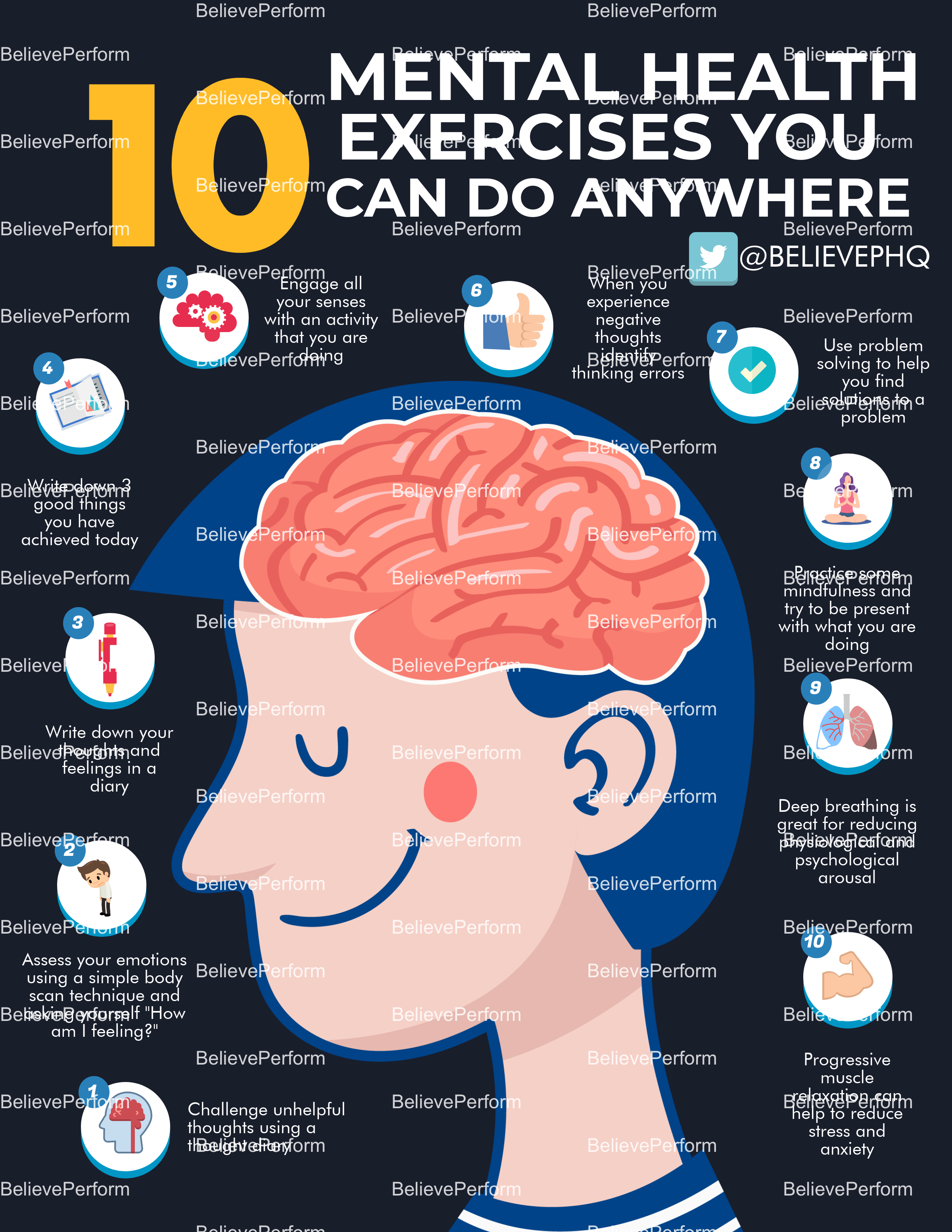Mental health exercises are vital for maintaining emotional well-being. They can reduce stress and improve your mood.
In today’s fast-paced world, mental health often takes a backseat. Many people focus on physical fitness, neglecting their emotional health. Mental health exercises are activities that help you manage stress, anxiety, and depression. They promote positive thinking and emotional stability.
Simple practices, like deep breathing or journaling, can make a big difference. These exercises are easy to incorporate into daily life. They don’t require special equipment or a lot of time. By dedicating a few minutes each day, you can enhance your mental resilience. This blog will explore different mental health exercises. Learn how to boost your emotional well-being with these simple practices.

Credit: www.priorygroup.com
Importance Of Mental Health
Mental health is very important for everyone. It affects how we think, feel, and act. Good mental health helps us handle stress better. It lets us make wise choices. It helps us relate well with others. Poor mental health can cause sadness. It may lead to worry. It can make daily tasks hard.
Mental health impacts our daily life. Good mental health boosts happiness. It increases productivity. It improves relationships with friends and family. Poor mental health can slow us down. It might make us feel tired. It often affects our work and school. Good mental health is key to a happy life.
Daily Mindfulness Practices
Start your day with morning meditation. Find a quiet spot. Sit comfortably. Close your eyes. Focus on your breath. Breathe in deeply. Breathe out slowly. Let thoughts come and go. Do not judge them. Stay present. Enjoy the calm. Feel the peace. Practice for five minutes each day.
Mindful breathing is easy. Sit or stand comfortably. Close your eyes if you like. Take a deep breath in. Feel the air fill your lungs. Exhale slowly. Notice the air leaving. Focus on the breath. If your mind wanders, bring it back. Do this for a few minutes. Feel more relaxed. Repeat whenever needed.
Physical Activities For Mental Health
Yoga helps calm the mind. It also improves flexibility. Simple poses like the child's pose or cat-cow are great. Breathe deeply during each pose. This makes you feel relaxed. Regular yoga reduces stress. It can also boost your mood. Try to practice yoga daily. Even 10 minutes can help. Remember, you don't need to be perfect. Just do your best.
Walking in nature is very calming. Trees and plants make you feel good. Fresh air is also helpful. Try walking for 20 minutes. Do this a few times a week. Notice the sounds and smells around you. This helps you stay present. Walking also gives you exercise. It improves your overall health. Walking with friends can be fun too. Share this time with family. Everyone can benefit.
Creative Expression
Engaging in art and craft activities helps the mind relax. Drawing, painting, or making crafts can be fun. It helps express feelings. These activities can make you feel happy. It's a way to show your creativity. You don't need to be perfect. Just enjoy the process. Use bright colors. Make simple shapes. Art can be calming.
Writing in a journal helps clear the mind. It is a great way to express thoughts. Write about your day. Write about feelings. It helps you understand yourself better. Journals can be private. You can write anything. It’s your space. No one will judge. Keep it simple. Write a little each day. It can be very helpful.
Social Connections
Being part of a community can help you feel less alone. Joining clubs or groups can be fun. You meet new people and make friends. These connections support mental health. Simple activities like attending local events bring joy. Volunteering also connects you with others. Helping people makes you feel good. Community centers often have events. These are great for meeting others.
Support groups provide a safe space to talk. Sharing experiences helps you feel understood. Everyone in the group can relate. This can be comforting. You can join groups for specific issues. For example, groups for anxiety or depression. There are also online support groups. These are helpful if you can't attend in person. Support groups foster a sense of belonging. They remind you that you are not alone.
Healthy Sleep Habits
Bedtime rituals help the mind relax. A warm bath can be soothing. Soft music helps calm thoughts. Reading a book relaxes the brain. Try meditation to ease stress. These habits signal sleep time to your body.
Screens keep the brain awake. Avoid phones and tablets before bed. The light from screens tricks the brain. It thinks it's still daytime. This makes it hard to sleep. Read a book instead. Use dim lights in the bedroom. This helps the body know it's time to rest.
Diet And Nutrition
Eating the right foods can help your brain. Blueberries are very good. They can protect your brain from damage. Nuts and seeds are also helpful. They have vitamin E which is good for your brain. Fish like salmon is rich in omega-3 fatty acids. These are good for your brain cells. Adding avocados to your diet is wise. They help with blood flow to the brain. Dark chocolate is also good. It has antioxidants that help your brain stay sharp.
Drinking water is very important. Your brain needs water to work well. Without enough water, you can feel tired and dizzy. Try to drink 8 glasses of water every day. Fruits and vegetables like cucumbers and oranges have water too. They can help you stay hydrated. Avoid drinks with too much sugar. They are not good for your brain. Green tea is a good choice. It can help you stay alert and focused.

Credit: members.believeperform.com
Setting Boundaries
Balancing work and life is important for your mental health. It helps you feel happier and less stressed. Make time for family and friends. Take breaks during work hours. Enjoy hobbies and activities. Rest is crucial. A good balance makes you more productive.
Saying no is a key skill. It protects your energy and time. Practice saying no to tasks you can't handle. It's okay to decline extra work. Prioritize what matters most to you. This helps you avoid feeling overwhelmed. Remember, it's fine to put yourself first.
Gratitude Practice
Write three things you are thankful for each day. This can help you feel better. It can be simple things. Like a warm cup of tea. Or a friend’s smile. This habit makes you notice good things.
Celebrate small successes. Did you finish a book? That is great. Maybe you cooked a new dish. Good job! Small wins matter. They add up. They make you feel proud. They build confidence. Notice and enjoy these moments.
.png?width=489&height=346&name=Mental%20health%20exercise%20benefits%20(3).png)
Credit: www.usaycompare.co.uk
Frequently Asked Questions
What Are Mental Health Exercises?
Mental health exercises are activities designed to improve mental well-being. They include mindfulness, meditation, and cognitive exercises. These practices help manage stress, anxiety, and depression.
How Do Mental Health Exercises Help?
Mental health exercises help by reducing stress and anxiety. They improve emotional resilience and mental clarity. Regular practice enhances overall mental well-being.
Can Mindfulness Improve Mental Health?
Yes, mindfulness can significantly improve mental health. It promotes relaxation and reduces stress. Mindfulness enhances focus and emotional regulation.
Are There Exercises For Anxiety Relief?
Yes, there are specific exercises for anxiety relief. Deep breathing, progressive muscle relaxation, and mindfulness are effective. These techniques calm the mind and reduce anxiety symptoms.
Conclusion
Caring for mental health is vital for overall well-being. Simple exercises help. They reduce stress and boost mood. Try deep breathing or mindful meditation daily. Regular physical activity also supports mental health. Connect with loved ones often. Practice gratitude and positive thinking.
These habits build resilience. Keep exploring and find what works best. Prioritize your mental health every day. Small steps lead to big changes. Start today and feel the benefits.
.png)






0 Comments